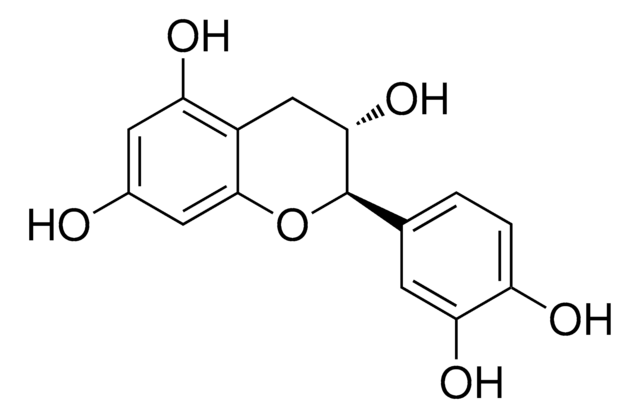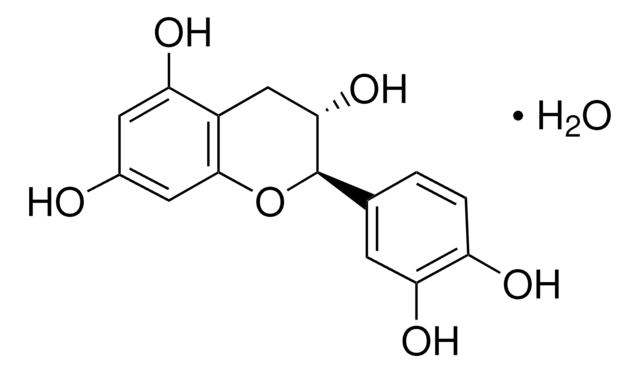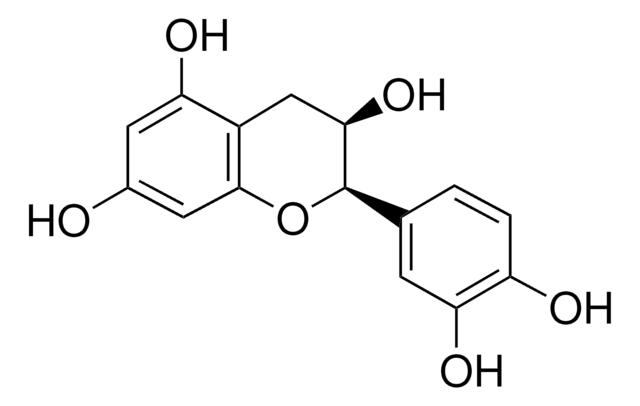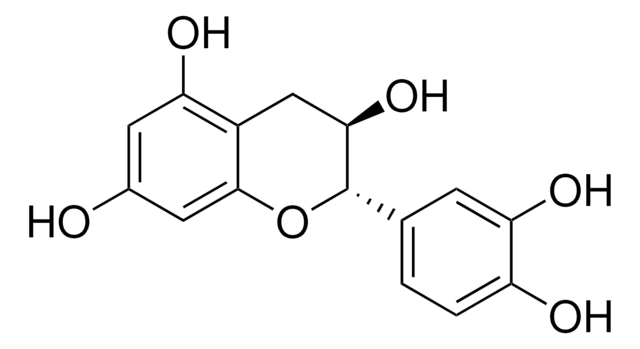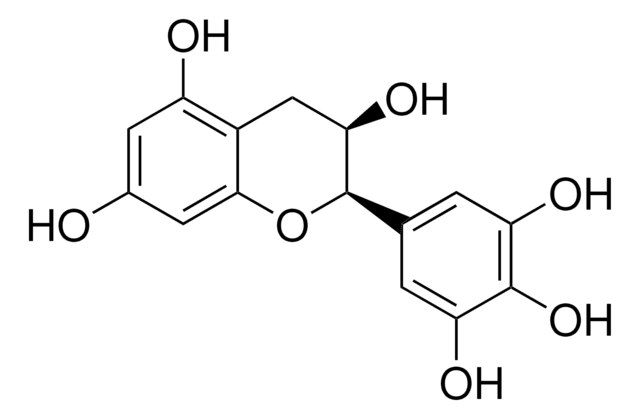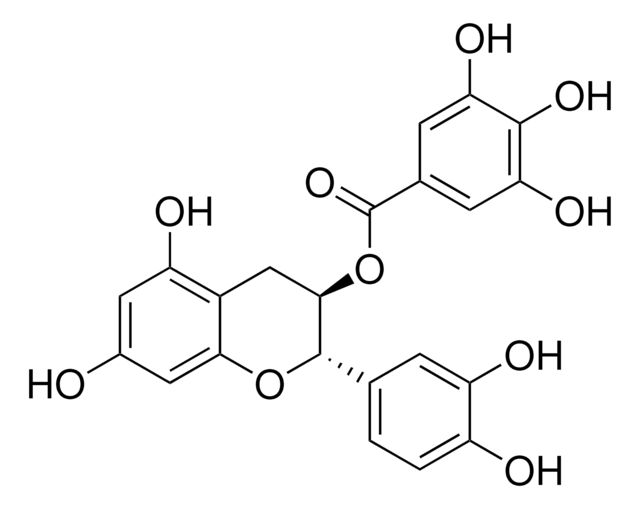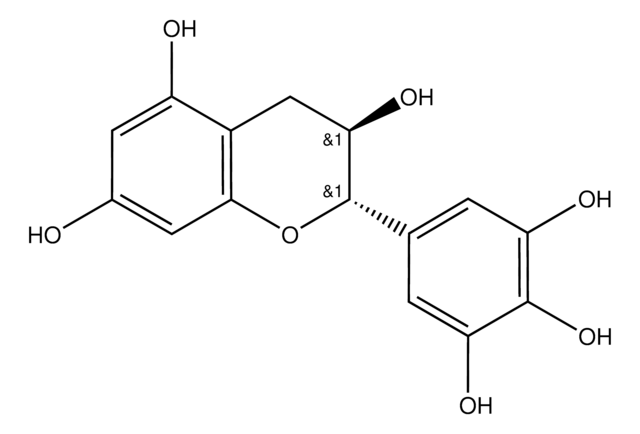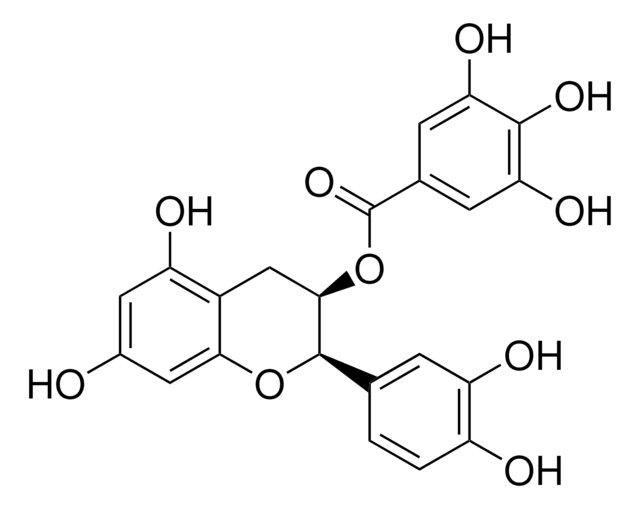43412
(+)-Catechin
analytical standard
Synonym(s):
(+)-Cyanidanol, D-Catechin
About This Item
Recommended Products
grade
analytical standard
Quality Level
assay
≥99.0% (HPLC)
shelf life
limited shelf life, expiry date on the label
technique(s)
HPLC: suitable
gas chromatography (GC): suitable
application(s)
food and beverages
format
neat
storage temp.
2-8°C
SMILES string
O[C@H]1Cc2c(O)cc(O)cc2O[C@@H]1c3ccc(O)c(O)c3
InChI
1S/C15H14O6/c16-8-4-11(18)9-6-13(20)15(21-14(9)5-8)7-1-2-10(17)12(19)3-7/h1-5,13,15-20H,6H2/t13-,15+/m0/s1
InChI key
PFTAWBLQPZVEMU-DZGCQCFKSA-N
Looking for similar products? Visit Product Comparison Guide
General description
Application
- Method development for the multi-determination of catechin and its diastereomers in the leaf extracts and infusions obtained from five Byrsonima species using high-performance liquid chromatography, combined with photodiode array (PAD) and circular dichroism (CD) detectors
- Determination of catechin in commercial green and black tea samples using magnetic solid phase extraction (MSPE) based on a novel adsorbent— O-carboxymethyl-chitosan-g- acrylic acid sodium salt (O-CMCs-g-AAS) copolymer deposited on magnetic graphene oxide (MGO), for sample pre-treatment and gas chromatography-mass spectrometry (GC-MS)
- Multi-residue analysis of eight catechins and four theaflavins in three different commercial tea infusions (green, black, and oolong) by ultra high-performance liquid chromatography in combination with triple-quadrupole tandem mass spectrometry (UHPLC-MS-MS)
- Simultaneous detection and quantification of four phenolic compounds— catechin, caffeic acid, rutin, and trans-cinnamic acid, using ultrasonic-assisted extraction and HPLC coupled with diode array detection from Physalis angulata L. plant material samples
- Multi-residue determination of catechins, caffeine, and polyphenols, from 45 fresh Jukro tea leaf samples, collected at 40, 60, and 90-day intervals, by an HPLC-based method combined with PDA detection
Packaging
signalword
Warning
hcodes
Hazard Classifications
Eye Irrit. 2 - Skin Irrit. 2 - STOT SE 3
target_organs
Respiratory system
Storage Class
11 - Combustible Solids
wgk_germany
WGK 3
flash_point_f
Not applicable
flash_point_c
Not applicable
Choose from one of the most recent versions:
Already Own This Product?
Find documentation for the products that you have recently purchased in the Document Library.
Customers Also Viewed
Protocols
HPLC Analysis of Polyphenols in Nero d'Avola Red Wine on Discovery® HS C18 (UV 280 nm)
Protocol for HPLC Analysis of Flavonoids on Ascentis® RP-Amide
Our team of scientists has experience in all areas of research including Life Science, Material Science, Chemical Synthesis, Chromatography, Analytical and many others.
Contact Technical Service